At least 6583 people deported in 3 months. Report of a Guinean man killed during deportation.
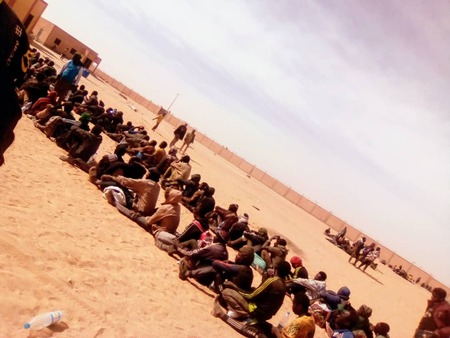
People deported from Algeria at Assamaka, December 2021
©Alarme Phone Sahara
During the months of April, May and June 2022, at least 6583 people were deported from Algeria to Niger, according to Alarme Phone Sahara whistleblowers in Assamaka, on the Algerian-Nigerian border. The number of people deported during the first 6 months of 2022 then rises to at least 11,652.
Since March 2022, Alarme Phone Sahara teams have been reporting an increasingly precarious situation in Assamaka and northern Niger towns for thousands of deportees.
Report of a Guinean migrant killed by Algerian deportation forces
According to a report on the website "Aventuriers Migrants Page" of 18th of July 2022, a Guinean migrant named Hamed died of injuries and fractures due to violence during deportation and ill-treatment of migrants in the desert by the Algerian police.
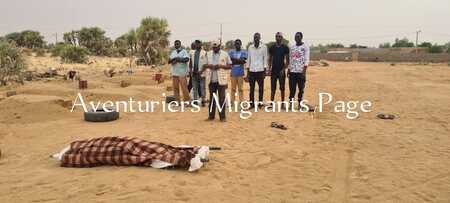
Burial of Hamed, killed by Algerian security forces according to
This scandalous and deplorable case remains to be confirmed and clarified.
Deported to the desert. The unofficial deportation convoys of 3rd of April, 16th of May, 24th of May, 17th of June and 22nd of June 2022
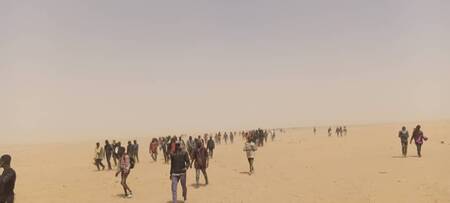
Arrival of deportees at Assamaka on foot, 8th of March 2022
©Alarme Phone Sahara
The people deported in the "unofficial" convoys, mostly not Nigeriens, but nationals of other countries, are still left at "Point Zero" in the border area between Algeria and Niger, in the middle of the desert. The deportees have to walk between 15 and 20 kilometres through the desert to reach Assamaka, the first Nigerien town after the Algerian border. With this practice, the Algerian security forces always put the lives of the deportees at risk.
Alarme Phone Sahara whistleblowers in Assamaka, Algerian-Nigerian border, report:
3rd of April 2022: 301 deportees in an unofficial expulsion convoy, including 7 women, 2 minor boys and 292 men, arrived in Assamaka on foot, after Algerian forces had dropped them off at Point Zero 15km from Assamaka. The largest groups of deportees were 95 Guineans and 73 Malians. Among them were 25 nationals from Chad, 18 from Sudan, 21 from Burkina Faso, 19 from Ivory Coast, 16 from Senegal, 2 from Cameroon, 6 from Benin, 16 from Nigeria, 5 from Niger itself, 3 from Togo, one person from Liberia and one from Ghana.
16th of May 2022, around 08:30 in the morning: Arrival on foot of 950 deportees in Assamaka, including 15 women, 2 minor girls, 926 men and 7 minor boys. Again, the largest groups were 318 from Mali and 301 from Guinea Conakry. In addition 5 from Niger, 21 from Benin, 33 from Burkina Faso, 27 from Cameroon, 3 from Guinea-Bissau, 51 from Gambia, 85 from Ivory Coast, 9 from Liberia, 8 from Nigeria, 28 from Sierra Leone, 24 from Senegal, 33 from Sudan, 3 from Ghana and one person from Togo
24th of May 2022: 641 deportees arrived on foot in Assamaka, including 4 women, 1 minor boy and 636 men. The largest groups were 264 nationals from Guinea Conakry and 185 from Mali. In addition 96 from Chad, 79 from Sudan, 34 from Ivory Coast, 17 from Burkina Faso, 3 from Sierra Leone, 2 from Liberia, 13 from Benin, 27 from Nigeria, 6 from Senegal, 2 from Gambia,
17th of June 2022: Arrival on foot of 46 deportees in Assamaka, including 15 from Mali, 10 from Nigeria, 2 from Burkina Faso, 6 from Cameroon, 5 from Guinea Conakry, 6 from Sudan, one from Senegal and one from Togo.
22nd of June 2022: Arrival on foot of 736 deportees in Assamaka, including 6 women, 4 minor boys, one minor girl and 725 men. The largest groups 201 nationals from Guinea Conakry and 244 from Mali. In addition 23 from Benin, 25 from Burkina Faso, 17 from Cameroon, 37 from Gambia, one person from Ghana, 32 from Côte d'Ivoire, 8 from Liberia, 30 from Nigeria, one person from Niger, 33 from Senegal, 15 from Sierra Leone, 61 from Sudan, 7 from Chad, and one person from Togo
The plight of migrants deported in convoys from Algeria to the Niger border
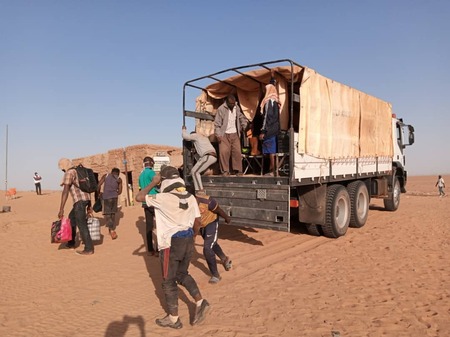
People loaded on trucks for deportation from Algeria to Assamaka, Niger,
30th of September 2020. © 2020 IOM Niger
According to descriptions from deportees and drivers, transport in unofficial deportation convoys takes place in very harsh and violent conditions:
Transport from detention centres in the northern cities of Algeria, such as Oran or Algiers, to Tamarasset in the south in buses escorted by the national police.
According to many testimonies of deportees, it is common for mobile phones, cash and all personal belongings to be taken away before transport.
From Tamanrasset to Point Zero on the border with Niger, people are loaded into trucks where they have to stay in the back of the truck for hours, squeezed together, with no possibility of sitting properly, with very few breaks, with insufficient food and water supplies and no possibility of going to the toilet.
Acts of violence by security forces are frequent in the detention centres and also during transport.
Official deportation convoys of 5th and 18th of April, 26th of May, 5th, 17th, 24th and 27th of June 2022
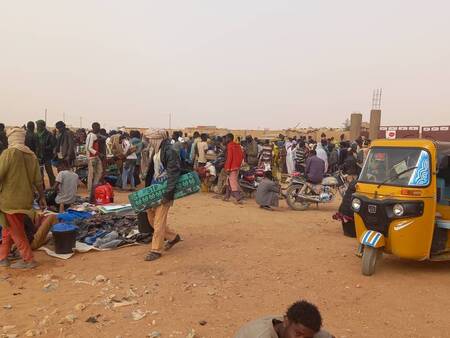
Deported citizens of Niger arrive in Agadez, 10th of March 2022
©Alarme Phone Sahara
The official deportation convoys take place on the basis of an deportation agreement between Algeria and Niger signed in 2014. The people deported in these convoys are generally citizens of Niger. Unlike the unofficial convoys, these people are taken directly to the city of Agadez.
5th of April 2022: Arrival of a large official deportation convoy with 1120 Nigerien citizens, including 17 women, 19 underage girls, 21 underage boys and 1063 men.
18th of April 2022: Arrival of an official deportation convoy carrying 310 Nigerien citizens, including 11 women, 17 minor girls, 23 minor boys and 259 men.
26th of May 2022: Arrival of an official deportation convoy carrying 781 Nigerien citizens, including 81 female minors, 452 males, 71 females and 177 male minors.
05th of June 2022: Arrival of an official deportation convoy carrying 773 Nigerien citizens, including 542 men. 49 women. 89 minor boys. and 93 minor girls.
17th of June: Arrival of an official deportation convoy carrying 191 Nigerien citizens, including 16 minor girls, 144 men, 16 women and 15 minor boys.
24th of June: Arrival of an official deportation convoy carrying 699 Nigerien citizens, including 51 women, 519 men, 59 minor boys and 70 minor girls.
27th of June at 11:43 am: Arrival of an official deportation convoy carrying 35 Nigerien citizens, including 3 minor girls, 1 minor boy, 2 women and 29 men.
Systematic disregard for the rights of children and minors
The figures show, among other things, that there were at least 1386 minor girls and boys deported from Algeria to Niger during the first 6 months of 2022; the vast majority of these young people are Nigerien citizens deported in official convoys. This high figure is again worrying, given that cases of child abuse and separation of children from their parents are regularly reported from deportation convoys from Algeria to Niger. In the deportation practices of the Algerian state, disregard for the rights of children and the particular vulnerability of children and minors is systematic.
Nigerien deportees: arriving empty-handed, abandoned by the state
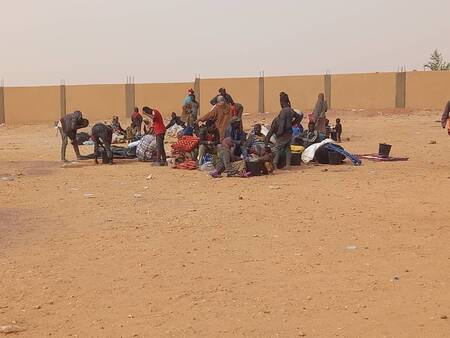
Deported citizens of Niger arrive in Agadez, 10th of March 2022
©Alarme Phone Sahara
Another serious problem is that since 2020, the state of Niger no longer supports its own citizens deported from Algeria to return to their respective communities of origin. It should be noted that those deported from Algeria to Niger usually arrive empty-handed, as money and valuables have usually already been taken from them by Algerian security forces. In such a precarious situation, it is very difficult for deported Nigeriens to finance the journey from Agadez, where the official deportation convoys usually end, to their respective towns and villages of origin.
This pitiful situation once again raises the question of how the funds that the Nigerien state receives through the migration control agreements with the European Union are actually used.
Alarme Phone Sahara strongly criticises the fact that the state of Niger has withdrawn this basic support from its citizens who have already suffered the damaging and traumatic experience of deportation. Instead, the state of Niger should take a stand against the persecution and mass deportation policy of the Algerian state and cancel the deportation agreement it signed with Algeria in 2014.
Stranded in Niger at a time of deepening misery
According to reports from Alarme Phone Sahara's whistleblowers, conditions for deportees and the migrant population have deteriorated in all the different towns in northern Niger in the face of a general situation of aggravated misery and impending famine triggered by, among other things, shortages and a massive increase in the price of foodstuffs on the world market. In this precarious survival situation, thousands of people remain stranded in Niger with neither the means to continue their migration project nor to return to their countries of origin.
In light of this situation, Alarme Phone Sahara demands:
- Deportations from Algeria, Libya and other countries must be stopped.
- The deportation agreement between Algeria and Niger, and all deportation agreements, must be cancelled.
- IOM must use its resources to support deportees who reallly wish to return to their countries of origin.
- Support for migrants in distress must be guaranteed unconditionally and must not depend on accepting so-called "voluntary return".
- The IOM must ensure that those received in its centres are provided with decent living conditions, including food supply, medical care, hygiene and accommodation.
- The state of Niger must continue to support its citizens who are deported from Algeria and other countries to return to their regions and communities of origin instead of abandoning them in conditions of distress.
- Countries in the sub-region should support their citizens who really wish to return without complication.
- Stop the policies of outsourcing European borders on African soil!
- No to the new "working agreement" between FRONTEX and EUCAP Sahel Niger which aims to intensify the criminalisation and persecution of migration under the pretext of "combating migrant trafficking".

